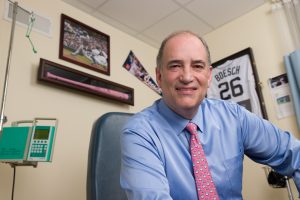
Cape Cod Oncologist Victor Aviles, MD: Offering Hope to Cancer Patients, Ballplayers, and Many More
Dr. Victor Aviles, a compassionate Cape Cod oncologist bringing hope and advanced cancer care to the community.
HIPAA Alert: Potential Data Breach Learn More
Questions on Oncology, Hematology and/or Infusion Clinical Services due to COVID-19 Crisis – CALL 833-698-1623
Important Information for Our Patients Regarding the Coronavirus.
RCCA Providing Area Cancer Patients with Access to Care During Coronavirus Outbreak
RCCA Offering Patients Virtual Visits During Coronavirus Pandemic
Regional Cancer Care Associates, LLC (RCCA) is ensuring that people with cancer — whether they are already patients of RCCA or not — can receive care at one of RCCA’s 31 locations in New Jersey, Connecticut, Maryland, Pennsylvania, and the Washington, DC area during the coronavirus crisis.
“This pandemic has besieged the American healthcare system, not only straining the capacity of emergency departments and intensive care units, but also preventing many people with other serious illnesses from receiving vital care. In response to this situation, RCCA has made a commitment to provide care not only to its long-established patients, but also to those recently diagnosed with cancer who need to begin treatment, and – if necessary during this period — to people who have been receiving care at hospitals or other facilities that are now difficult or impossible for them to access,” said Denis Fitzgerald, MD, who serves as Board Chairperson of RCCA, one of the nation’s largest networks of oncology specialists.
“Many patients recently diagnosed with cancer cannot easily get in to see their specialists at major hospitals in New York, Philadelphia, or elsewhere. Our community-based offices are able to see these patients near their homes, and we have a long track record of effectively communicating and collaborating with colleagues elsewhere as we initiate care or provide continuation of care. Further, our RCCA oncology and hematology specialists at the John Theurer Cancer Center of Hackensack University Medical Center continue to provide a full-range of sophisticated services, including transplant care and CAR-T cell therapy,” noted Iuliana Shapira, MD, a board-certified medical oncologist and hematologist who serves as RCCA’s Chief Medical Officer.
Patients who would like to make an appointment to receive care from RCCA can email
Dr. Shapira at ChiefMedical@regionalcancercare.org.
Dr. Shapira added that as an organization dedicated to providing cancer care in community-based clinics, RCCA has extensive operational expertise in protecting patient health. “All we do is cancer and hematologic care. The only patients we see are those with cancer or hematologic conditions, and our offices and processes are designed with those people’s specific needs in mind. Much of what we do to enhance the patient experience is readily apparent, such as the convenience of being able to park just outside the front door of a community clinic, be greeted by a receptionist who knows you, and quickly be taken to an exam room. But a significant portion of our patient-focused approach goes on ‘behind the scenes,’ such as the rigorous processes we employ for regularly sanitizing every room, space and piece of medical equipment in our offices,” she said.
Dr. Fitzgerald noted that beyond providing expanded access to area cancer patients, RCCA has taken several other steps in response to the coronavirus, including:
Beyond those steps, Dr. Fitzgerald said, it is important for patients – and all people – to follow the general guidelines put forth by the CDC, which include social distancing, washing hands, using sanitizer when soap and water are not available, and promptly reporting new symptoms of fever, cough, shortness of breath to their physician.
“We will continue to adjust as needed during the coronavirus outbreak to protect patients, their families, and our staff,” said Dr. Fitzgerald, a board-certified medical oncologist and hematologist practicing in RCCA’s Little Silver, NJ office. He added, “While it’s important to change approaches in step with evolving circumstances, one thing that won’t change is our commitment to providing patients with the care they need. RCCA’s doctors, nurses, and other team members are here for people with cancer, whether you’ve just been diagnosed, are in the midst of treatment, or have completed active treatment and have a question or need follow-up care. Oncologists devote their careers to seeing people with cancer through the worst of times, and – together – we’ll get through this trying time, as well.”
*******
With more than 80 cancer specialists practicing at more than 20 care centers located throughout Connecticut, Maryland, New Jersey and the Washington, DC area, RCCA provides care to roughly 22,000 new cancer patients and 225,000 established patients each year. RCCA offers those patients immunotherapy, targeted treatment, cell-based therapy and other cutting-edge treatments and diagnostic modalities, as well as access to clinical trials. RCCA is one of fewer than 200 medical practices in the country selected to participate in the Oncology Care Model (OCM), a recent Medicare initiative aimed at improving care coordination and access to and quality of care for Medicare beneficiaries undergoing chemotherapy treatment.
For more information or to schedule an appointment,
call 844-346-7222. You can also schedule an appointment by calling the RCCA location nearest you.

Dr. Victor Aviles, a compassionate Cape Cod oncologist bringing hope and advanced cancer care to the community.

The 20th Annual Hope Music Fest, presented by the Hope Community Cancer Center division of Regional Cancer Care Associates (RCCA), returns for a night filled

In 2011, community-based cancer specialists were celebrating rapidly improving developments for their patients. But at the same time, the outlook for their practices was less

Regional Cancer Care Associates is one of fewer than 200 medical practices in the country selected to participate in the Oncology Care Model (OCM); a recent Medicare initiative aimed at improving care coordination and access to and quality of care for Medicare beneficiaries undergoing chemotherapy treatment.